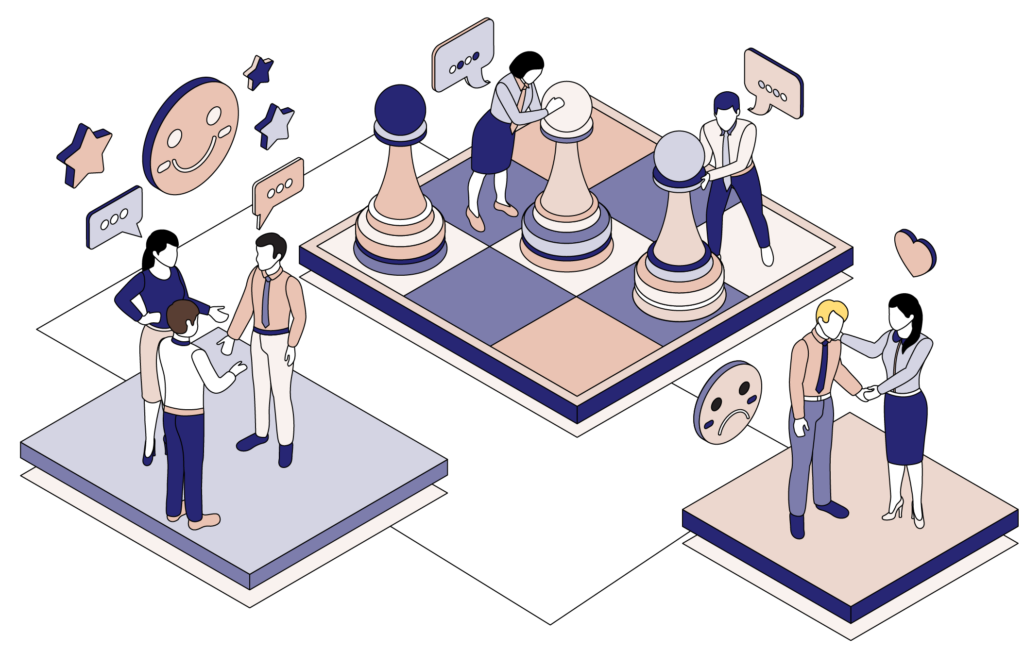The workplace is evolving faster than ever, and many companies are prioritizing soft skills in the hiring process consequently. Therefore, developing a specific set of skills is crucial to improve your career prospects as a consultant. Here are the highlights of our conversation with Adrien Handjani, Experienced Consultant, exploring the most important soft skills.
Why are soft skills so important in a consulting job?
Obtaining the appropriate university degree or diploma is often seen as the critical factor to building a successful professional career. This hyperfocus on educational backgrounds may seem, in the eyes of consultants, to diminish the benefit of mastering soft skills.
However, I believe a change of perspective is necessary to understand the importance soft skills can have to pave the way for a successful career as a consultant.
What are the 3 most useful soft skills when working as a consultant?
I would say effective communication, emotional intelligence and accurate decision making are vital if you want to thrive.
Communication is key in many other roles, why is it especially important when you are a consultant?
Humans are inherently social beings and, as such, conversation plays a central role in our lives. That’s why it is vital for workers to master the art of communication and for employers to understand its high value. Successful consultants are master communicators, in both oral and written form to ensure the best quality of service for the client.
As a consultant, what constitutes a good communicator?
To begin with, when a consultant is brought on board to support the activities of an external company, it is important for them to actively listen and gather all necessary information to be able to contribute meaningfully. When they are able to take the lead in any conversation, they will effectively boost both their company’s reputation and the consultant’s personal brand.
Moreover, everyone should take to heart the following expression: credit where credit is due. It does not matter if recognition is delivered orally or in writing, a consultant – or anyone belonging to any profession for that matter – should always acknowledge and show appreciation to all project collaborators. Alone, we might go faster, but together, we go further.
What is an easy trap you can avoid when communicating about a project?
Communication involves both compromise and agreement. When meeting with project collaborators, consultants must keep track of their project’s main points and ensure that all participants are aware of them. One of the most common mistakes that beginners tend to make is closing agreements verbally. Without any written documentation, consultants may face situations where the other party does not understand their involvement, or simply does not intend to fulfill the obligations they verbally arranged. Being able to diplomatically restate what has been decided and send a written summary of meetings can prevent these situations from occurring.
You also mentioned emotional intelligence. Why is it so important in a consulting role?
Emotional intelligence is defined as the ability to perceive, use, understand, manage, and handle emotions. People with high emotional intelligence are better able to avoid conflicts in the workplace, build strong relationships with others, and manage work-related stress calmly and effectively.
Consultants should never let their emotions influence their response in professional settings. It is crucial to keep in mind that communications must remain polished and professional at all times, regardless of any panic, anger or frustration certain situations may induce. Emotional regulation skills can enable a consultant to turn the discussion of a negative outcome or incident into a beneficial and productive detour.
Is emotional intelligence the recipe for a positive work environment?
Both burnout and bore out can have a terrible, if not destructive, impact on a person’s health and professional career. That is why, regardless of a consultant’s specific ambitions or goals, it is important to be aware of one’s emotional state and to notify managers or clients when necessary. Despite the potential consequences, people should never be ashamed to express their feelings and ask for help when they need it. Moreover, sharing emotions in the workplace helps create a supportive environment.
Moving on to decision-making, why is this soft skill also crucial for consultants?
Nothing makes more of a difference than someone who can provide solutions and implement them as quickly as possible in times of crisis. That’s why accurate decision-making can help mitigate any errors.
What makes a good decision maker?
A good decision-maker assesses situations effectively and accepts rejection. When consultants join a new project, they may not be aware of their client’s entire history or any internal inconsistencies. This can lead the consultants to present project plans that may seem adequate at first glance but in the end are not approved because it clashes with unseen factors.
The ability to make accurate predictions is an essential decision-making skill. A consultant who can detect possible issues and prevent mistakes before they occur will always be of great value to any client. Being able to spot and alert others of potential problems and at the same time present solutions to resolve these issues is a significant skill.
Do you have one last advice to share?
Keep in mind that, like technical skills, soft skills can be weakened if they are not used. To continuously practice these skills, there are different trainings available that suit every budget and desired outcome.
At Amaris Consulting, we believe everyone is unique and our role is to unlock your true power. Meet some of our talented people and discover our open positions.


